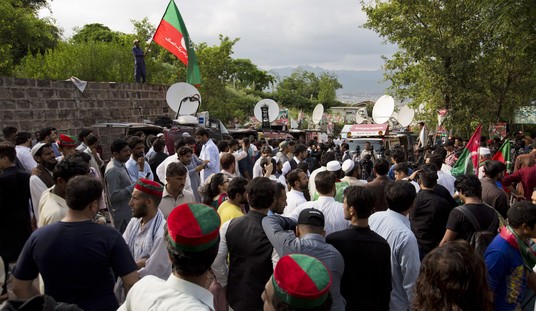Steven Cook, the Council on Foreign Relations’ main expert on Egypt, posted an inaccurate and unprincipled attack on me today at the CNN “Global Public Square” blog.
“An objective observer,” Dr. Cook writes of Egypt’s present crisis, “might come to the reasonable conclusion that Egypt needs help and that the international community should do what it can to help pull Egyptians back from the brink. That is certainly the view of most analysts from across the political spectrum, yet in one corner of the commentariat [namely mine], they are actually hoping for Egypt to fail.”
On the contrary: I believe that the foreign policy establishment (including Dr. Cook) is engaged in a hapless and counterproductive effort to save the unsalvageable. That is my assessment as a specialist in country risk with thirty years’ experience, including a stint as Bank of America’s global head of bond research. I never wrote that an Egyptian collapse was desirable, only that it was inevitable. I might be wrong, but this week’s events in Egypt surely do not make me look wrong.
Dr. Cook refers specifically to my Jan. 22 essay, “Denial still is a river in Egypt,” in which I argue that Egypt’s economic collapse has made the largest Arab state ungovernable. He denounces as “a-historic revisionism” my “claim that economic collapse was the reason for the uprising.” Revisionism? I have been arguing since February 2011 that the global spike in food prices undermined Egypt, which imports half its food. I wrote back then:
Even Islamists have to eat. It is unclear whether President Hosni Mubarak of Egypt will survive, or whether his nationalist regime will be replaced by an Islamist, democratic, or authoritarian state. What is certain is that it will be a failed state. Amid the speculation about the shape of Arab politics to come, a handful of observers, for example economist Nourel Roubini, have pointed to the obvious: Wheat prices have almost doubled in the past year.
Since then I have chronicled the unfolding economic and political breakdown in Egypt in more than two dozen essays. And here is what Egypt’s leading daily al-Ahram wrote yesterday:
On 25 and 28 January 2011, thousands chanted “Bread” on streets across Egypt, highlighting the economic nature of the uprising. The chant represented the people’s aspirations for a fairer economic system, protesting high inflation rates, low wages and the unavailability of daily rations. It is no coincidence that bread was the first word of the revolution’s main slogan (“Bread, freedom, dignity”), as it is a daily staple for millions of people, making Egypt the largest per capita wheat consumer and importer.
Egypt’s Defense Minister Gen. Abdul al-Sisi warned this morning that state failure was a possibility:
The continuation of the struggle between political forces and their disagreement over the administration of the country may lead to the collapse of the state and threaten the future of upcoming generations.
That is precisely what I warned about two years ago. Dr. Cook ignores my early and accurate forecast of the present crisis. Just at the point where Egypt’s most influential newspaper and its defense minister echo my longstanding analysis, Dr. Cook wants to change the subject. He accuses me of holding absurd views that I never expressed:
What we have here is nothing more than a crude lament that the United States did not give Mubarak a so-called “green light” to crack down two years ago. This is revealing for what Spengler/Goldman does not know about Egypt, its history, and the causes of Hosni Mubarak’s fall, but everyone is a Middle East expert these days. Even if President Obama had signaled that there would be no penalty for an Egyptian version of Tiananmen, it would not have been forthcoming.
In fact, I wrote just the opposite, namely that Egypt would become a failed state whether or not Mubarak hung on. As a practical matter, I think that the United States made a mistake by issuing a peremptory order that “Mubarak must go,” in February of 2011. Mubarak was a longstanding American ally and the United States should have eased the transition as a matter of loyalty. Never did I suggest that a Mubarak crackdown on the protesters would have solved the problem.
Worst of all, Dr. Cook claims that I am writing about Egypt for crude political motives: “Spengler/Goldman is not actually interested in understanding Egypt. No, this isn’t an intellectual enterprise: Spengler/Goldman is engaged in an ideological contest. His target? The Republican Party, for not hanging Egypt on President Obama.”
I’ve been critical of the Republican Party leadership, to be sure, because the Republican mainstream wants to keep handing out taxpayers’ money as well as F-16s and Abrams tanks to the Morsi government. The Obama administration’s enthusiasm for Egypt’s Muslim Brotherhood government has been unseemly, and I want Republicans to take a very different view.
The foreign policy establishment told us that the Arab Spring was the dawn of a glorious new era of democracy in that part of the world. The establishment was dead wrong. Now it tells us that Western taxpayers have to bail out Egypt — a $22 billion annual bill, according to Bloomberg News. Reasonable people can argue about whether that is throwing good money after bad, or even worse, feeding the mouth that bites us. But Dr. Cook takes it as an article of faith that state failure in Egypt is unthinkable, and substitutes mendacious ad hominem attacks for argument. He doesn’t do his position any good by smearing analysts who disagree with the establishment view. The shrillness of his screed suggests that he is aware of the weakness of his position.
I should add that Cook tries to tar the estimable Shoshana Bryen of the Jewish Policy Center with the same brush. It’s an honor to take incoming next to Mrs. Bryen.









Join the conversation as a VIP Member